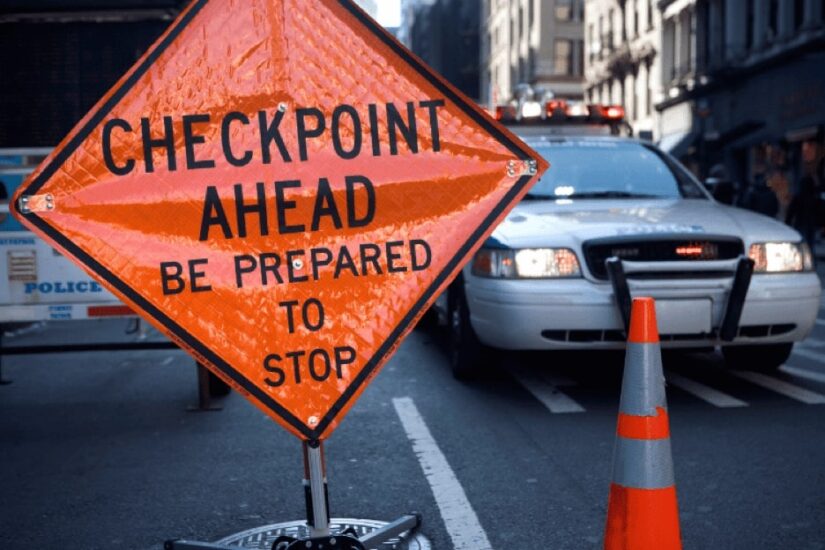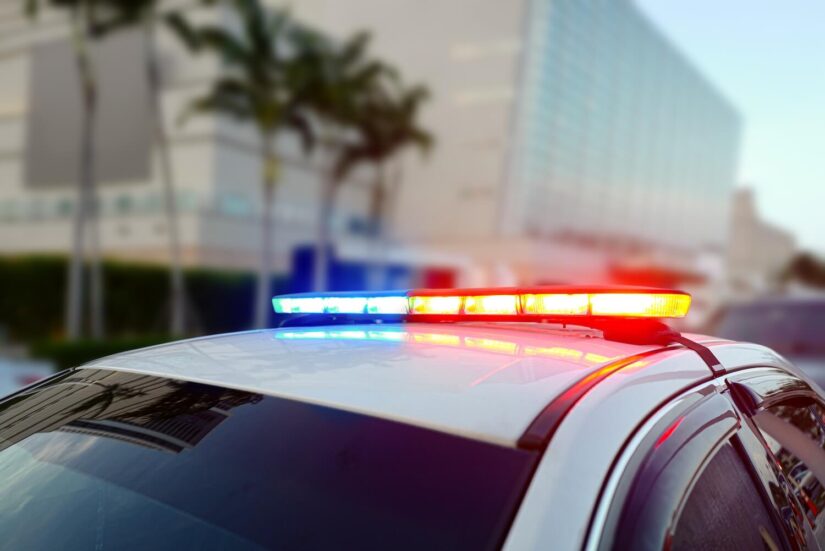
November 16, 2023
No, DWI checkpoints are illegal in Texas. Here’s why:
- Texas Law: The Texas Constitution prioritizes privacy rights. Courts have ruled that stopping drivers without individualized suspicion violates these rights.
- Federal Law vs. Texas: While federal law permits DWI checkpoints, Texas courts have interpreted the state constitution to provide stronger privacy protections, rendering such checkpoints unconstitutional within the state.
- Enforcement Alternatives: Instead of checkpoints, Texas uses targeted patrols, “No Refusal” weekends (to secure blood test warrants quickly), and community tip lines to combat impaired driving.
Quick Overview:
- Legal Status: DWI checkpoints are prohibited in Texas.
- Reason: Violates state constitutional protections against unreasonable searches.
- Enforcement Methods: Focus on targeted patrols and lawful stops with reasonable suspicion.
Understanding your rights during a police stop is crucial in Texas. If stopped, stay calm, provide necessary documents, and know you can refuse searches or sobriety tests (though refusal may have consequences). Protect your rights and consult an attorney if needed.
Are DWI Checkpoints Legal in Texas?
No, DWI checkpoints are illegal in Texas. While federal law allows these roadblocks, Texas has chosen a different path based on its constitution and court decisions. This difference arises from how Texas interprets its state constitutional protections.
Federal Law on DWI Checkpoints
The U.S. Supreme Court has determined that sobriety checkpoints align with the Fourth Amendment. Federal law allows these checkpoints under specific standards, aiming to balance government interests with individual privacy. However, this federal stance does not require states to implement them. Each state has the freedom to decide based on its own legal framework. As a result, 38 states permit DWI checkpoints, while others, including Texas, have opted to ban them.
Texas Court Rulings
Texas courts have consistently ruled against DWI checkpoints, citing violations of state constitutional protections. In 1991, the Texas Court of Criminal Appeals ruled in Regina H. Holt vs the State of Texas that these checkpoints are unconstitutional because they lack individualized probable cause. The decision referenced Article I, Section 9 of the Texas Constitution.
In 1994, the court reinforced this position, stating that without a state law providing clear operational guidelines, sobriety checkpoints violate the Texas Constitution. Since no such law exists, these checkpoints remain illegal. Texas interprets its constitutional protections as offering stronger privacy rights than those under federal law.
Other Types of Roadblocks in Texas
While DWI checkpoints are banned, Texas does allow certain other roadblocks under specific conditions. For example, license and registration checkpoints are permitted for administrative purposes. Additionally, federal agencies operate border checkpoints under federal jurisdiction.
These roadblocks differ from DWI checkpoints because they serve administrative or federal purposes rather than targeting drivers without individualized suspicion. Unlike some states where legislative bans exist, Texas’ prohibition of DWI checkpoints is firmly rooted in court rulings.
Why Texas Bans DWI Checkpoints
Texas prohibits DWI checkpoints because its state constitution prioritizes privacy rights more strongly than federal law. This stance stems from Texas’s interpretation of its own constitution, which Texas law offers stricter protections against unreasonable searches and seizures than federal guidelines do.

Texas Privacy Laws vs. Federal Law
At the heart of Texas’s ban on DWI checkpoints is its dedication to state-level privacy protections. While the Fourth Amendment permits sobriety checkpoints under certain conditions, Texas contends that stopping drivers without specific suspicion violates personal privacy. Unlike many other states, Texas has never implemented a policy allowing such checkpoints, and its Transportation Code does not address them. As a result, these checkpoints are deemed unconstitutional under state law.
This position places Texas among the 13 states that have ruled sobriety checkpoints unconstitutional, standing apart from the 38 states that follow federal precedent. Importantly, Texas’s prohibition is based on judicial rulings rather than newly enacted legislation. Within these constitutional boundaries, Texas focuses on enforcing DWI laws through targeted and lawful methods rather than relying on checkpoints.
How Texas Enforces DWI Laws Instead
Instead of using DWI checkpoints, Texas employs alternative strategies that align with its constitutional standards while effectively addressing impaired driving. Officers are authorized to conduct stops when they have reasonable suspicion or probable cause of intoxicated driving. One key approach is targeted patrols, where law enforcement focuses on areas with high DUI activity.
Another method is the use of “No Refusal” weekends, during which officers can quickly secure warrants for blood tests if a driver refuses a breathalyzer test. For instance, during a Montgomery County operation, officers stopped 50 drivers and arrested 12 for DWI, with the average breath test results exceeding the legal limit. Additionally, community tip lines allow citizens to report suspected impaired drivers, providing officers with the reasonable suspicion needed to conduct lawful stops.
These enforcement strategies show how Texas effectively addresses impaired driving while maintaining its commitment to constitutional privacy protections.
Your Rights During Police Stops in Texas
While Texas prohibits DWI checkpoints, law enforcement can still stop vehicles if they have reasonable suspicion or probable cause. In these situations, understanding your constitutional rights is essential.
How to Handle a Police Stop
If you’re pulled over, stay calm, avoid sudden movements, keep your hands visible, and use polite, formal language. Eye contact can also help maintain a non-confrontational tone.
When asked, provide your name, driver’s license, registration, and proof of insurance. If an officer inquires whether you have a firearm in the vehicle, Texas law requires you to answer honestly.
Additionally, you have the right to remain silent and do not have to provide information about your actions or whether you’ve been drinking.
If an officer requests to search your vehicle, you can legally decline unless they have probable cause or a warrant. Clearly state that you do not consent to the search. Similarly, you can refuse field sobriety or breathalyzer tests in Texas. However, under the state’s implied consent law, refusing these tests might lead to an automatic license suspension, and your refusal could be used against you in court.
Understanding these rights is critical, especially when dealing with evidence obtained during stops.
Evidence From Illegal Checkpoints Cannot Be Used
Since Texas courts have declared DWI checkpoints unconstitutional, any evidence gathered during such stops is inadmissible in court. Attorney George Napier, who focuses on DWI cases, explains:
This protection also extends to evidence obtained through unreasonable searches or seizures. Even if the evidence against you seems compelling, if it was gathered during an illegal stop, your attorney may challenge its use in court. If you suspect you were stopped at an illegal checkpoint, document the encounter thoroughly. Note details such as the time, location, officers’ badge numbers, and patrol car numbers.

When You Need a Lawyer
If your rights are violated during a stop, taking immediate legal action is critical. If you’re arrested, state that you want an attorney and remain silent until legal counsel is present.
Reach out to a criminal defense attorney if you believe your Fourth Amendment rights were violated – whether due to a stop without reasonable suspicion, a search conducted without probable cause, or an encounter at an illegal checkpoint. Legal assistance is also crucial if you’ve refused sobriety tests, as the consequences can be severe. An experienced attorney can evaluate your case, challenge improperly obtained evidence, and advocate for your rights.
If law enforcement violates your rights, don’t wait to seek help. Contact a DWI lawyer immediately. For example, The Napier Law Firm offers 24/7 availability and free consultations to assess your case and build a strong legal defense. Acting quickly can make a significant difference when your constitutional protections are on the line.
DWI Enforcement Methods in Texas Compared
Since Texas prohibits DWI checkpoints, law enforcement has developed alternative strategies to address impaired driving. These methods are designed to focus enforcement efforts and streamline evidence collection while adhering to constitutional protections.
Targeted patrols are a cornerstone of DWI enforcement in Texas. Officers focus their efforts in areas known for high rates of drinking and driving, such as entertainment hubs and major highways during peak times. They monitor for behaviors like swerving, speeding, or erratic driving, using these as grounds for initiating stops based on reasonable suspicion. These patrols are especially active during periods when impaired driving is most common.
Law enforcement often implements “No Refusal” weekends during holidays, a time when alcohol consumption spikes. During these periods, law enforcement expedites the process of obtaining blood warrants for drivers who refuse breath tests. For instance, a Harris County operation reported a compliance rate of 75% during these weekends, significantly higher than the usual 50%.
In one Memorial Day weekend operation in Harris County, authorities collected 12 blood samples, with test results ranging from 0.118 to 0.321, and an average BAC of approximately 0.21.
The table below provides a breakdown of the primary enforcement methods used in Texas:
Enforcement Methods Comparison Table
| Enforcement Method | Legality in Texas | Privacy Implications | Effectiveness |
| DWI Checkpoints | Illegal | High privacy intrusion – stops without reasonable suspicion | Not applicable due to constitutional restrictions in Texas |
| Targeted Patrols | Legal | Moderate privacy impact – requires reasonable suspicion | Effective for identifying impaired drivers through observed behavior |
| “No Refusal” Weekends | Legal | Moderate privacy concerns – streamlines blood warrant process | Highly effective during holidays – compliance rates in Harris County rose to 75% |
With an estimated 80,000 to 90,000 DWI cases annually in Texas, these targeted strategies play a vital role in maintaining public safety while respecting individual rights.
These approaches illustrate how Texas law enforcement balances constitutional limits with effective measures to reduce impaired driving and enhance road safety.
Protecting Your Rights as a Texas Driver
Knowing your rights during a police stop is essential for every driver in Texas, particularly given the state’s distinct approach to DWI enforcement. While Texas considers DWI checkpoints unconstitutional, law enforcement relies on targeted patrols and specialized operations to identify impaired drivers.
If you’re pulled over, stay calm, keep your hands visible on the steering wheel, and provide your driver’s license, registration, and insurance when requested. You are not obligated to take field sobriety tests or answer questions about your activities or alcohol consumption. Additionally, you can refuse a vehicle search unless the officer has a warrant or probable cause. How you handle the stop can significantly impact your ability to protect your rights later on.

After the stop, thorough documentation is key. If you believe your rights were violated, take note of the officers’ names, badge numbers, and details about the stop. This information is vital if you need to challenge the legality of the stop in court. Evidence obtained from an illegal stop cannot be used against you. If your defense attorney can prove the stop was unlawful, any subsequent evidence—such as field sobriety tests, breathalyzer results, or officer observations—may be excluded.
For Texas drivers facing DWI charges or rights violations, The Napier Law Firm provides 24/7 availability and free consultations. Their attorneys, well-versed in Texas laws, offer aggressive representation to challenge unlawful stops and protect your constitutional rights throughout the legal process.
Being informed about your rights and Texas’s enforcement practices empowers you to handle police encounters with confidence while ensuring your constitutional protections are upheld.
FAQs
What are ‘No Refusal’ weekends in Texas and what do they mean for drivers?
In Texas, ‘No Refusal’ weekends are specific enforcement periods, typically aligned with holidays, where law enforcement ramps up efforts to address drunk driving. Here’s how it works: if a driver suspected of driving while intoxicated (DWI) refuses to take a breath or blood test, officers can quickly secure a warrant to perform a mandatory blood draw.
The goal of these weekends is straightforward—discourage drunk driving and minimize alcohol-related crashes. To make this process efficient, law enforcement teams work closely with on-call judges and medical personnel, ensuring warrants and tests are handled swiftly. While drivers should remain informed about their legal rights, it’s equally important to recognize the serious implications of refusing chemical tests during these heightened enforcement periods.
How do police in Texas decide if they have reasonable suspicion to stop a driver?
In Texas, law enforcement officers need reasonable suspicion to pull over a driver. This means they must witness specific, clear behaviors that suggest the driver might be breaking traffic laws or engaging in criminal activity. For instance, actions like swerving, speeding, running a red light, or other signs of impaired or unsafe driving can trigger a stop.
It’s important to note that reasonable suspicion is a lower threshold than probable cause, but it still requires more than just a gut feeling. An officer must be able to explain the specific observations that led to their decision to stop you. Knowing this can help you better understand and protect your rights during a traffic stop.
What should I do if I think my rights were violated during a police stop in Texas?
If you think your rights were violated during a police stop in Texas, it’s important to stay calm and handle the situation carefully. Politely assert your rights. For example, you have the right to remain silent and can refuse searches unless the officer presents a warrant or has another legal reason. If you’re able to, consider recording the interaction to have a clear record of what occurred.
Once the stop is over, reach out to an experienced attorney as soon as you can. They can review the details of your case, explain your legal options, and help address any potential violations of your rights.